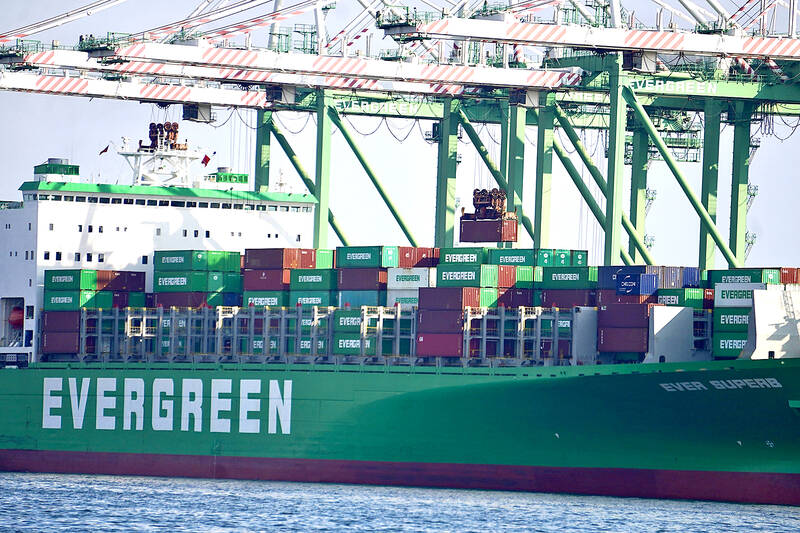Export orders expanded by 10.8 percent annually last month, the highest year-on-year growth in two years, thanks to robust demand for chips used in artificial intelligence (AI) and high-performance computing (HPC) devices mainly from Nvidia Corp, the Ministry of Economic Affairs said yesterday. It also outpaced the ministry’s upper estimate of 5.88 percent annual growth.
Export orders rose from US$42.49 billion in April last year to US$47.1 billion last month, while export orders dropped by 0.1 percent from US$47.16 billion on a monthly basis, the ministry said.
The ministry said it expects the growth momentum to carry into this month and export orders to rise between 1.8 percent and 6.2 percent annually to between US$46.5 billion and US$48.5 billion, as AI chip demand remains vigorous.

Photo: CNA
“April’s stronger performance and the growth prospects for May gave us higher confidence that export orders in the second quarter would return to growth on an annual basis, as compared with our initial estimate at the beginning of this year,” Department of Statistics Director Huang Yu-ling (黃于玲) said via telephone.
Electronic products orders soared by 22.7 percent year-on-year to US$17.1 billion last month, primarily fueled by robust demand for foundry services, chip distribution and printed circuit boards for AI-related applications and HPC devices, the ministry said. Orders from the US grew at the fastest pace of 35.8 percent.
Orders for information and communications technology products last month rose 8.4 percent annually to US$13.05 billion, backed by increased server orders on resilient demand for AI applications and cloud-based devices. Orders from Malaysia grew the highest at 53.3 percent, as manufacturers shifted production from China to the Southeast Asian country amid the US-China technology dispute.
Optoelectronics products orders expanded 13.5 percent annually to US$1.66 billion last month, attributable to increases in orders for TV panels and optoelectronic cameras. TV panel prices have also seen sustained high levels.
The price of 65-inch TV panels is to climb 1.1 percent month-on-month, or US$2 per unit, this month, extending price hikes over the past few months, market researcher TrendForce Corp (集邦科技) said yesterday.
Three major traditional sectors returned to growth last month, driven by more marked restocking demand.
Orders for basic metals, mainly for steel, rose by 3.5 percent year-on-year to US$2.23 billion last month mainly due to restocking demand, the ministry said.
Plastics product orders increased 4.2 percent annually to US$1.61 billion on inventory buildup demand, the ministry said, adding that prices were supported by higher raw material prices.
Petrochemical products orders rose by 8 percent year-on-year last month to US$1.54 billion, as OPEC increased global crude oil prices by 5.9 percent year-on-year, the ministry said.
Machinery orders shrank 3.4 percent year-on-year to US$1.59 billion last month, because increases in equipment spending from semiconductor companies were still not enough to offset the broader weakness in capacity expansion amid a slow global economic recovery, the ministry said.

Semiconductor shares in China surged yesterday after Reuters reported the US had ordered chipmaking giant Taiwan Semiconductor Manufacturing Co (TSMC, 台積電) to halt shipments of advanced chips to Chinese customers, which investors believe could accelerate Beijing’s self-reliance efforts. TSMC yesterday started to suspend shipments of certain sophisticated chips to some Chinese clients after receiving a letter from the US Department of Commerce imposing export restrictions on those products, Reuters reported on Sunday, citing an unnamed source. The US imposed export restrictions on TSMC’s 7-nanometer or more advanced designs, Reuters reported. Investors figured that would encourage authorities to support China’s industry and bought shares

FLEXIBLE: Taiwan can develop its own ground station equipment, and has highly competitive manufacturers and suppliers with diversified production, the MOEA said The Ministry of Economic Affairs (MOEA) yesterday disputed reports that suppliers to US-based Space Exploration Technologies Corp (SpaceX) had been asked to move production out of Taiwan. Reuters had reported on Tuesday last week that Elon Musk-owned SpaceX had asked their manufacturers to produce outside of Taiwan given geopolitical risks and that at least one Taiwanese supplier had been pushed to relocate production to Vietnam. SpaceX’s requests place a renewed focus on the contentious relationship Musk has had with Taiwan, especially after he said last year that Taiwan is an “integral part” of China, sparking sharp criticism from Taiwanese authorities. The ministry said

US President Joe Biden’s administration is racing to complete CHIPS and Science Act agreements with companies such as Intel Corp and Samsung Electronics Co, aiming to shore up one of its signature initiatives before US president-elect Donald Trump enters the White House. The US Department of Commerce has allocated more than 90 percent of the US$39 billion in grants under the act, a landmark law enacted in 2022 designed to rebuild the domestic chip industry. However, the agency has only announced one binding agreement so far. The next two months would prove critical for more than 20 companies still in the process

CHANGING JAPAN: Nvidia-powered AI services over cellular networks ‘will result in an artificial intelligence grid that runs across Japan,’ Nvidia’s Jensen Huang said Softbank Group Corp would be the first to build a supercomputer with chips using Nvidia Corp’s new Blackwell design, a demonstration of the Japanese company’s ambitions to catch up on artificial intelligence (AI). The group’s telecom unit, Softbank Corp, plans to build Japan’s most powerful AI supercomputer to support local services, it said. That computer would be based on Nvidia’s DGX B200 product, which combines computer processors with so-called AI accelerator chips. A follow-up effort will feature Grace Blackwell, a more advanced version, the company said. The announcement indicates that Softbank Group, which until early 2019 owned 4.9 percent of Nvidia, has secured a